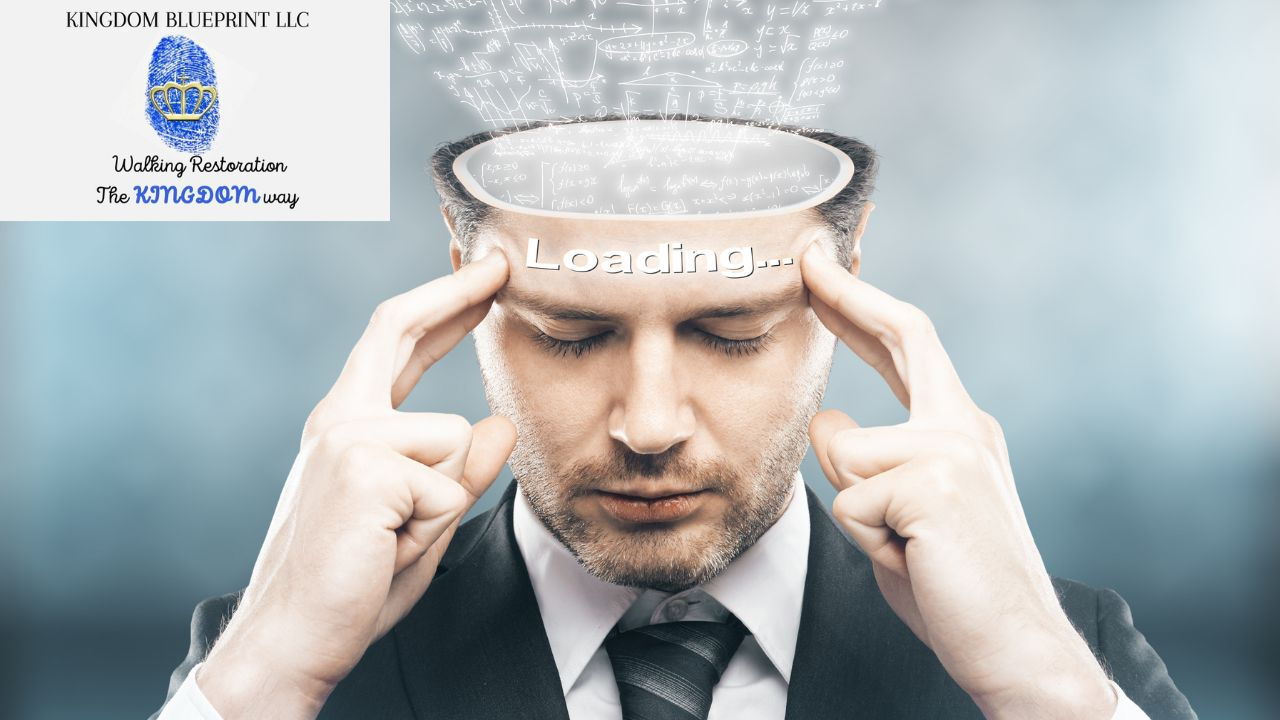Emotional Intelligence Components: Learn How To Control Your Emotions With Components Of Emotional Intelligence | Kingdom Blueprint
Oct 08, 2023Emotional intelligence (EI) is a concept that has been around for decades, but it has only recently been gaining traction in the professional world. It is a set of skills that allow us to understand and manage our own emotions, as well as the emotions of others. According to the American psychologist Daniel Goleman, there are five key components of emotional intelligence: self-awareness, self-regulation, motivation, empathy, and social skills. These components have various areas of emotional intelligence as well that are sub-categories if you will. These emotional intelligence areas help us understand how people do the most basic things and why they do them.
Self-awareness is the ability to recognize and understand one's own emotions, as well as the ability to recognize how one's own actions and emotions affect others. Self-regulation is the ability to control one's own emotions and behavior, even in stressful situations. Motivation is the internal drive to achieve goals and to strive for success. Empathy is the ability to understand and share the feelings of others. Finally, social skills are the ability to build relationships and resolve conflicts through effective communication and body language.
Looking At Emotional Intelligence Components: Key Components Of Emotional Intelligence | Kingdom Blueprint

High emotional intelligence is essential for effective leaders in professional settings. According to the Harvard Business Review, emotional intelligence is one of the core components of successful leadership. It allows leaders to build stronger relationships with their team members, self-regulate their own emotions, and understand how their actions affect others. With these five key elements, leaders can create a positive outlook and resolve conflicts in a constructive manner.
What is Emotional Intelligence?
Emotional Intelligence (EI) is a concept that has been around for decades but has recently gained more attention in the professional world. It is the ability to understand and manage one's own emotions, as well as the emotions of others. Psychologist Daniel Goleman first popularized the concept in his 1995 book, Emotional Intelligence: Why It Can Matter More Than IQ.
According to Goleman, EI is composed of five key components of emotional intelligence: self-awareness, self-regulation, motivation, empathy, and social skills. These components also have emotional intelligence areas for each component. These areas can be essential in the emotional make-up of a person. Self-awareness is the ability to recognize and understand one's own emotions, as well as how one's actions and emotions affect others. Self-regulation is the ability to control one's own emotions and behavior, even in stressful situations.
Emotional Intelligence Areas: Subcategories of Self-Awareness Detailed
In the previous section, we discussed the importance of self-awareness as a key aspect of emotional intelligence. Now, let's take a closer look at some subcategories within this area that can help us better understand and improve our self-awareness.
Self-Understanding
Self-understanding refers to having a deep knowledge and understanding of one's own thoughts, feelings, and motivations. This includes being aware of our strengths, weaknesses, and values. When we have a clear understanding of who we are, we can make better decisions and communicate more effectively with others.
Self-Regard
Self-regard is the level of confidence and respect we have for ourselves. It involves having a positive self-image and feeling worthy of love, happiness, and success. Those with high levels of self-regard are more resilient in the face of
Self-awareness is a crucial aspect of emotional intelligence, and it can be divided into three subcategories: Emotional Self-Awareness, Accurate Self-Assessment, and Self-Confidence. Let's take a closer look at each of these areas and understand how they contribute to overall self-awareness.
Emotional Self-Awareness:
It involves being in tune with your feelings, both positive and negative, without judgment or suppression. Accurate self-assessment involves being honest with ourselves about our strengths and weaknesses. It also includes recognizing areas where we may need improvement or growth. This requires a certain level of self-reflection and the ability to take constructive criticism.
-
Why it's important: Being emotionally self-aware allows you to better manage your emotions and reactions, leading to more effective communication and decision-making. It also helps you understand how your emotions influence your thoughts and behaviors, allowing you to make conscious choices rather than acting on impulse.
-
How to improve: To improve emotional self-awareness, start by paying attention to your feelings and labeling them. Ask yourself why you are feeling a certain way and try to understand the root cause. Practicing mindfulness can also help in developing emotional self-awareness. Take a moment to pause and focus on your thoughts and emotions without judgment.
This is why self-awareness is one of the most important emotional intelligence areas. It forms the foundation for all other areas and allows us to better understand ourselves and others. By developing our self-awareness, we can improve our relationships, communication, and decision-making skills.
Areas of Emotional Intelligence: Subcategories to Motivation Explained
Emotional intelligence (EI) is the ability to recognize and manage emotions in ourselves and others. It plays a crucial role in our personal and professional lives, helping us build successful relationships, make better decisions, and achieve our goals.
One of the key areas of EI is motivation. Motivation involves the drive to initiate and sustain goal-directed behavior. But did you know that there are different subcategories of motivation within the realm of emotional intelligence? Let's take a closer look at these subcategories and how they contribute to our overall EI.
Subcategories of Motivation

In the previous section, we discussed motivation as one of the five main components of emotional intelligence. Now, let's take a closer look at the subcategories that fall under this component.
1. Self-Determination
Self-determination refers to a person's ability to set and strive towards their goals with determination and persistence. This involves having a strong sense of self-awareness, understanding one's own strengths and weaknesses, and being able to effectively set realistic goals for oneself.
Self-determination is an important aspect of motivation as it allows individuals to take control of their actions and decisions, leading to a greater sense of accomplishment and satisfaction when goals are achieved.
2. Self-Efficacy
Self-efficacy is the belief in one's own ability to successfully complete a task or achieve a particular goal. It is closely related to self-confidence and plays an important role in motivation.
Individuals with high self-efficacy are more likely to take on challenging tasks, persist through obstacles, and ultimately achieve their goals. On the other hand, those with low self-efficacy may become discouraged and give up easily.
3. Self-Discipline
Self-discipline is the ability to control one's impulses, emotions, and behaviors in order to have a "big picture" mindset at all times. It involves setting priorities, making sacrifices, and staying focused on the task at hand despite distractions or temptations.
Individuals with strong self-discipline are able to delay gratification, persevere through difficult tasks, and maintain a consistent level of motivation toward their goals.
4. Resilience
Resilience refers to one's ability to bounce back from setbacks and failures. It involves having a positive attitude, being adaptable, and having the ability to learn from mistakes.
Resilient individuals are able to view failures as learning opportunities and use them to fuel their motivation towards future success.
5. Intrinsic vs. Extrinsic Motivation
Finally, it is important to distinguish between intrinsic and extrinsic motivation. Intrinsic motivation comes from within oneself, driven by personal interests, enjoyment, or a sense of purpose. Extrinsic motivation, on the other hand, comes from external factors such as rewards, recognition, or pressure from others.
While both types of motivation can be effective in driving behavior, research has shown that individuals who are intrinsically motivated tend to have a stronger sense of well-being and are more likely to achieve long-term success. Thus, it is important to cultivate intrinsic motivation rather than relying solely on external factors for motivation.
One of the strongest emotional intelligence components is motivation. Motivation is the internal drive to achieve goals and succeed. Also has many different areas of emotional intelligence in it as well. Empathy is the ability to understand and share the feelings of others. Finally, social skills are the ability to build relationships and resolve conflicts.
High emotional intelligence is essential for effective leaders in professional settings. According to the Harvard Business Review, emotional intelligence is a key component of leadership roles. It helps leaders build stronger relationships with their team members, self-regulate their own emotions, and understand how their actions affect others.
It also helps them communicate more effectively and maintain a positive outlook in stressful situations. Overall, emotional intelligence is an important element of a person's life and all of the elements of emotional intelligence need to be considered.
It is composed of five key components of emotional intelligence that help individuals understand their own feelings, as well as the feelings of others. It is essential for effective leaders in professional settings, as it helps them build relationships, resolve conflicts, and maintain a positive outlook.
The Five Components of Emotional Intelligence

Emotional intelligence components are a key element of success in both personal and professional settings. Psychologist Daniel Goleman first introduced the concept of emotional intelligence in the Harvard Business Review in 1995. He identified five key elements that make up emotional intelligence: self-awareness, self-regulation, motivation, empathy, and social skills. These components also have emotional intelligence areas included in them.
These five components are essential for effective leaders and stronger relationships in both personal and professional settings. Self-awareness is the ability to recognize and understand one's own emotions, feelings, and behavior. It is important to be self-aware in order to understand how one's actions affect others and how to resolve conflicts. Self-regulation is the ability to control one's own emotions and behavior, even in stressful situations.
It is important to be able to self-regulate in order to maintain a positive outlook and build relationships with others. Motivation is the internal drive to achieve goals and to be successful. Empathy is the ability to understand and share the feelings of others and is essential to emotional intelligence and being self-aware. Emotional awareness is key when trying to understand others. It is important to be able to empathize in order to build stronger relationships and communicate effectively.
Finally, social skills are the ability to interact with others in a positive way. This includes being able to read body language and to give and receive constructive feedback. These five components of emotional intelligence are essential for success in both personal and professional settings. By understanding and developing these five key elements, one can become a more effective leader and build stronger relationships.
Self-Awareness: Understanding Your Own Emotions

Self-awareness is arguably one of the most important emotional intelligence components. It involves understanding your own emotions and how they affect your behavior and the people around you. It also involves being aware of your own feelings and how they influence your actions. Self-awareness is the foundation of emotional intelligence, and it is essential for effective communication, social skills, and self-regulation.
High emotional intelligence involves understanding the five emotional intelligence components: self-awareness, self-regulation, interpersonal skills, relationship management, and internal motivation. Self-awareness is the ability to recognize and understand your own emotions, body language, and behavior. It also involves being aware of how your own feelings and actions affect others. Self-regulation is the ability to control your emotions and reactions in stressful situations. There are areas of emotional intelligence that include self-regulation as well. Subcategories for how individuals self-regulate.
All intense emotions whether they are negative emotions or positive emotions, require a sense of emotional regulation to control emotions. Controlling emotions or any sense of emotional control, is accepting emotions for what they are. Whether it is a negative emotion or just other unpleasant emotions that human beings face, you can not make positive emotions or negative emotions into a big deal.
Negative feelings can be intense emotions that need a deep breath and positive emotions to help mental health issues caused by overwhelming emotions. This can hurt your physical health if you feel sad or any form of emotion regulation is seen as a weakness, controlling anger is seen as a weakness.
Interpersonal skills involve the ability to build relationships and communicate effectively with others. Relationship management involves the ability to resolve conflicts and build stronger relationships. Technical skills are not included in the key components of emotional intelligence for a reason, mostly because they have a small value in the decision-making process.
They are also better able to manage their own behavior and reactions in stressful situations. The five key elements of emotional intelligence are essential for success in any leadership role. By understanding the components of emotional intelligence and developing self-awareness, you can become a more effective leader and build stronger relationships in both your personal and professional life.
Social Awareness: Understanding Others’ Feelings
Social awareness is an important component of emotional intelligence. It involves understanding and being aware of the emotions of others, as well as our own. It is the ability to recognize and understand the feelings of those around us, and to use this knowledge to build stronger relationships.
According to psychologist Daniel Goleman, there are five key elements of emotional intelligence: self-awareness, self-regulation, motivation, empathy, and social skills. Self-awareness is the ability to recognize and understand our own emotions and feelings. It is the ability to be aware of our own behavior and how it affects others. Self-regulation is the ability to control our own emotions and reactions in stressful situations. It is the ability to self-regulate and manage our own feelings and reactions. You need the technical skills to have a certain career.
However, the social awareness or cognitive intelligence to see negative emotions and maintain the emotional intelligence components that keep the emotional element of your leadership role stabilized. All the while considering your true feelings in a given situation is well, invaluable. That is how you sustain lifelong social relationships with that type of self-control. Research shows that co-workers want leadership to develop good social skills and improve social skills so that those strong social skills can make negotiating contracts better.
Empathy is the ability to understand and relate to the feelings of others. It is the ability to recognize and understand the emotions of those around us. Empathy is one of the key components of emotional intelligence because without empathy it is impossible to develop relationships. Social skills are the ability to communicate effectively and build relationships with others.
It is the ability to use body language, communication skills, and constructive feedback to build relationships and resolve conflicts. High emotional intelligence is essential for effective leaders in professional settings.
According to the Harvard Business Review, emotional intelligence is one of the core components of leadership. It involves understanding our own emotions and feelings, as well as those of others. It involves recognizing how our actions affect others and how our own behavior can have a positive or negative impact on a person's life. It also involves having a positive outlook and internal motivation to self-manage and self-regulate in order to build stronger relationships and resolve conflicts.
Self-Management: Controlling Your Own Emotions

Self-management is an important skill for any great leader. It involves the ability to control one's own emotions and reactions to situations, as well as the ability to empathize with others. According to peer-reviewed studies, those who are able to build empathy and manage change are more effective leaders. When it comes to managing emotions, it is important to be able to stay calm and composed when faced with bad news or difficult conversations.
This can be especially challenging when dealing with direct reports. However, with practice, it is possible to develop the skills necessary to remain composed and motivated in the face of adversity. Additionally, by learning to put yourself in someone else's shoes, you can become a better communicator and build a high degree of empathy. With these skills, you can become a more effective leader and better manage your own emotions.
Relationship Management: Building Stronger Relationships
Relationship management is an essential skill for any leader in several professional settings and adds to the elements of emotional intelligence. It involves the ability to self-regulate and control one's own emotions, as well as the ability to understand and empathize with the feelings of others. This is especially important when it comes to building stronger relationships with direct reports and managing change. Peer-reviewed studies have shown that great leaders have a high degree of empathy and the ability to put themselves in someone else's shoes.
This helps them to better understand the feelings of others and build empathy. It also helps them to be better communicators and motivators, which is essential for delivering bad news or teaching new skills. By developing these skills, leaders can become more effective in their role and build stronger relationships with their teams.
Conclusion: Why are the components of emotional intelligence important to someone trying to restore a marriage?
So, it is important for individuals to work on developing their emotional intelligence in order to maintain healthy relationships, including marriages. When marriage falls apart emotional intelligence is an advantage against the enemy (Satan) because you know what he is doing to your spouse.
Set-Up A Free Consultation Here Stay connected with news and updates!
Join our mailing list to receive the latest news and updates from our team.
Don't worry, your information will not be shared.
We hate SPAM. We will never sell your information, for any reason.













